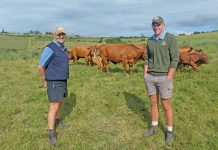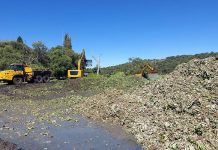Poog Henning and his son Carl farm on Mununzwu Estate, formerly known as Sweetwaters, outside Makhado (Louis Trichardt), and 5km west of Elim Hospital. When the apartheid government expropriated the farm for incorporation into the Venda homeland in the 1980s for use in an agricultural development project, Poog stayed on as farm manager.
Having lost their farm once, and with land claims still pending on Mununzwu, it would be understandable if the Hennings resented government, the surrounding Moddervlei community or even farming itself – but far from it. Not only is their company Mununzwu Newco producing export-class avocados and macadamia nuts, they continue to help developing farmers in the area, and with the government’s help have conducted a massive housing project for their 198 permanent workers, of which 137 are women. The Agricultural and Rural Development Corporation (ARDC) has tasked Mununzwu Newco with looking after the farm until all outstanding land claim issues have been settled.
Losing a family farm
Poog recalls the story his father, Johannes Stephanus Henning, told him of how the Hennings acquired the farm. Johannes arrived with his brother from the Free State in 1912. “There had been a huge drought in the Free and the two brothers decided to seek land with a lot of trees and running water to be able to continue with their dairy, and Moddervlei was it,” Poog recounts. Until the 1960s, the farm went through many changes, from a dairy to producing oranges and granadillas, seed potatoes, cotton, mealies and oats. “My father used to plant a lot of oats to sell to race horse owners in Johannesburg,” Poog recalls. “After a customer couldn’t pay for his seed potato order, he offered to settle his debt with avocado trees.” The first avocados were planted in 1961 and are still productive today. Macadamias followed in 1970.
In 1979 the National Party government forcibly bought many farms on the Moddervlei ridge to incorporate into the former Venda homelands for an agricultural project. The Henning farm was one of many expropriated at the time. Government intended it to be the nucleus of development of surrounding farms. Farmers would be able to use the farm’s infrastructure, including the packhouse, workshop and cold room facilities, and tap into its management expertise.
“It took a while before the farm was fully integrated into the homelands and we remained on it until 1984,” recalls Poog. When the farms were finally brought under the Venda Department of Agriculture (Agriven’s) jurisdiction, Poog was offered the chance to stay on as the farm’s manager, helping the emerging farmers involved in the development project. Other farmers who’d had their land expropriated had left the area, but Poog took the job. “Farming came first in my life,” he explains. “Besides, the farm is where I’ve lived all my life and my roots are here.
I remained positive that things would one day change for the better.” Because of the uncertainty about the farm’s future after the expropriation, Carl left it in 1981 after he had finished school. Having given up on the dream of working on the farm with his father, he served in the army until 1983 before attaining a BCom degree at the University of Witwatersrand and later an Honours (Investments) at Rand Afrikaans University.
Taking on Mununzwu
After the first democratic elections in 1994, the empowerment project changed ownership and reverted back to the Limpopo Department of Agriculture under the ARDC. The ARDC relinquished the farm’s management in 2003 and Carl returned in April 2004 the following year. The project was outsourced to Mununzwu Newco under Carl and Poog. Although there are a number of land claims on the farm which still need to be finalised, there is a positive relationship between the former owners (the Hennings, who’ve also submitted a land claim) and the claimants (the local Moddervlei community).
“I always dreamed of coming back to the farm where my roots are and where my forefathers are buried,” says Carl. “I had to wait more than 15 years before I could start doing what I loved best, farming.” Before Carl rejoined his father on the farm he was a portfolio manager in property investment, handling multimillion-rand investment portfolios. Though he has no formal agricultural training, Carl has brought other expertise to the business – all his financial knowledge and construction experience. “My father is from the old school and I brought a lot of fresh ideas which, combined with his vast farming experience, benefit the business immensely,” he explains.
Mununzwu Newco also works closely with the agriculture department. In March 2008 they donated 5 000 macadamia trees to the emerging Vhembe Macadamia Farmers Agric Corporative. The function was attended by 400 people, including Limpopo agriculture MEC, Dikeledi Magadzi, Mayor Gloria Mashaba of Makhado Municipality and Executive Mayor Philemon Mdaka of the Vhembe district.
During her speech Mayor Magadzi said, to much laughter, that Mununzwu Newco must have had advance knowledge of what was going to be said at the Polokwane ANC conference, because the developments at Mununzwu over the past few years encompasses exactly the wishes that government has for agriculture in the new South Africa. A month later, a farmers’ day was held at Mununzwu where Carl lectured members of the Vhembe Farmers Cooperative on how to prepare and plant macadamia trees. Afterwards, the spokesperson for the cooperative praised the Hennings for taking the initiative in helping emerging farmers and said he hoped Mununzwu would continue to transfer skills to new farmers.
Mununzwu Newco Housing Initiative
“Farmers should try and improve both their workers’ lives and the community they live in,” says Carl. “They’ll reap the benefits of a committed workforce who’ve regained their dignity and self respect. A motivated workforce is essential for achieving a good product that’s acceptable to your market.” The Hennings’ greatest achievement is the Mununzwu Newco Housing Initiative.
During the massive floods that hit Limpopo in 2000 many people, including some of the Hennings’ workers, lost their homes overnight. The rainfall was so severe that the mud and thatch houses belonging to some of the farmworkers collapsed on top of them during the night. Luckily no one was severely injured. Poog helped the worst-affected workers by erecting new temporary shelters from corrugated iron. In 2004, Poog and Carl decided to embark on a housing project to benefit both their present and retired workers. Seven beneficiaries were identified from among the poorest women on the farm, all with single-income households and many dependants.
The Hennings built them houses of at least 52m², with ceilings, guttering, and electric wiring, at a total cost of over R300 000. Poog hoped they could build another 100 houses, even though he had no idea where the funding would come from. In 2005 Carl had a meeting with the Limpopo MEC of local government and housing, Maite Nkoana-Mashabane, and gave a presentation on the housing project. “The MEC was impressed with the initiative, and she decided to grant 50 housing subsidies called, People’s Housing Process, to qualifying farmworkers in support of it,” Carl recalls. The housing project started in September 2006 with the same specifications as the previous units and was completed early in January 2007. Local community residents, who weren’t employed on the farm, were trained and employed on the building teams.
Each beneficiary was involved in the entire construction process and provided sweat equity by assisting with digging and casting foundations, and carrying building materials. “We spent many hours on project management, logistical support, and training labourers and artisans to deliver high-quality homes,” Carl recalls. Due to Mununzwu Newco’s diligence and good workmanship, it was awarded a further 68 houses, totalling 118 units from government funds.
Due to recent high building inflation, the government subsidy of R36 500 per house wasn’t enough to complete each house according to Mununzwu Newco’s standards, and the Hennings contributed another R4 000 per house. Mununzwu Newco had to use its own company trucks to deliver building material to each site. “These houses were built in 20 different locations within the Vhembe District, from Elim up to Thohoyandou, 80km away, which made logistical management a major challenge and more expensive,” explains Carl. The Hennings feel the housing project expresses their gratitude for all the workers’ years of service. It has contributed hugely to the quality of the farmworkers’ lives.
The dramatic improvement in morale has certainly boosted productivity on the farm. More importantly, the workers feel valued and have homes in which to raise their children and plan their future with dignity. Working for your workers Carl says that, in future, farmers will have to work harder for their money, not only because of the unfavourable business climate worldwide, but because of their greater social contribution to their workers and higher labour costs. “We can’t expect to prosper while our workers continue to live in abject poverty. Part of any profits should be ploughed back to upgrading our worker’s lives and the communities we live in,” he concludes. Contact Carl Henning on 083 277 2770. |
Thriving producers
Mununzwu Newco exports its avocados and macadamia nuts to various countries and also supplies some of the country’s largest chain stores, such as Woolworths. “We export most of our avocados to France,” explains Carl. “We use two different marketing companies. SAD in Wellington markets our macadamias both locally and internationally. For the avocados we use Limpopo-based company Tzaneen Fruit Packers.” The farm uses its own facilities on the property for picking and packaging before their marketing agencies fetch some of the product, and for supplying the local municipal markets.
Social upliftment
The Hennings’ sense of social responsibility was evident as far back as 1930 when Johannes Henning built a primary school on the farm. Since then, the family has embarked on many other social community projects to upgrade the standard of living in the village, including ploughing three school vegetable gardens. “That helps to motivate the children to grow their own food,” says Carl. This year Mununzwu Newco will complete the construction of a community crèche in the village. After witnessing the harsh conditions of the two crèches in Elim, run by two local women, they decided to help by building a proper crèche with enough facilities for the children, on land supplied by the local chief. “The two women will run the crèche as their own small business. This initiative is to empower rural women in business,” explains Carl.









